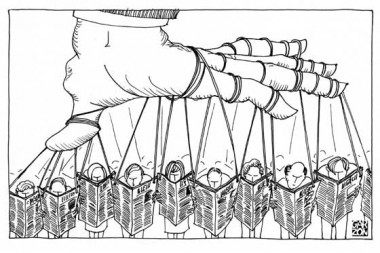Journalism and Reality: The US Media’s Reluctance at Presenting the Facts

One thing that I’ve learned from my four-plus decades in journalism is that many people only like reporting that reinforces what they already believe. Facts that go off in a different direction can make them angry – and they are usually not hesitant to express their anger.
For instance, in the 1980s, when I was covering the Nicaraguan Contra rebels for the Associated Press, many readers of AP copy, including some of my editors, shared Ronald Reagan’s enthusiasm for these “freedom fighters” whom Reagan likened to America’s Founding Fathers.
So, when I discovered the Contras engaging in a variety of criminal activity, from extrajudicial killings, rapes, torture and drug trafficking, my reporting was unwelcome both inside and outside the AP (and later I encountered the same hostility at Newsweek). The usual response was to challenge my journalism and to pretend that the ugly reality wasn’t the reality.
You might say that that’s just the life of a journalist. Get over it. And you’d have a point. But the larger problem is that this trend toward what you might call “selective narrative” appears to be accelerating. Ideologues and partisans don’t just make arguments for their causes, they create overarching narratives to validate their causes.
And the more money and the more media that a group has the more effective it is in imposing its narrative on the broader unsuspecting (and often ill-informed) public.
In the Contra example, many Americans believed in President Reagan and thus were open to the pro-Contra narrative that Reagan’s team skillfully deployed. Information that ran counter to the propaganda of “white hat” Contras fighting “black hat” Sandinistas was seen as discordant and needed to be stamped out – along with anyone associated with it.
In 1996, when San Jose Mercury News reporter Gary Webb called to ask me about my Contra-cocaine experience (before he published his “Dark Alliance” series), it was this hostility toward any criticism of the Contras that I warned him about as he contemplated reviving the scandal.
Tragically, my concerns – based on my own experience – were well-founded. Not only the CIA and government spokesmen went after Webb’s story but virtually all the major news organizations (which had ignored or disparaged the scandal in the 1980s). These events are recounted in the new movie, “Kill the Messenger.” [Also, see Consortiumnews.com’s “WPost’s Slimy Attack on Gary Webb.”]
But a similar pattern holds true in other cases of presenting facts that conflict with what some people choose to believe. I have seen this both in challenging mainstream “conventional wisdom” and out-on-the-fringe “conspiracy theories.” Many people only want their preconceptions reinforced; they don’t want to rethink them.
False Founding Narrative
Most recently, I have encountered this phenomenon in pointing out fallacies in the right-wing (and sometimes left-wing) Founding Narrative, which presents the Framers of the Constitution in anti-historical ways – in order to validate policies being promoted for the present, i.e., to make it appear that some modern position was shared by the Framers.
So, on the radical Left and Libertarian/Tea Party Right, you might get the depiction of the Framers as government-hating revolutionaries who wanted a heavily armed population prepared to kill representatives of an oppressive political system. It has also become an article of faith in some circles that the authors of the Constitution favored strong states’ rights and hated the notion of a strong central government.
Yet, that is simply not the history. The principal Framers of the Constitution were a group known as the Federalists. Led by General George Washington and his able acolytes James Madison and Alexander Hamilton, the Federalists despised the system of states’ rights contained in the Articles of Confederation and they assembled in Philadelphia in 1787, in part, out of alarm over the Shays Rebellion in western Massachusetts, which some of Washington’s former Revolutionary War commanders had just put down.
The Federalists devised as strong a central government as they could possibly get through to ratification. Madison even favored greater federal dominance by giving the U.S. Congress veto power over all state laws, a proposal that was watered down although federal law was still made supreme.
In other words, the Constitution’s Framers wanted to stabilize the young country, protect its fragile independence and rely on a strong central government to build its future. That is the history, albeit an inconvenient history for many folks these days who are selling the American people on a false Founding Narrative.
So, when I point out these facts, there is an angry backlash. I’m accused of being a “statist” or “just a journalist,” not a historian – whatever’s necessary to protect the false narrative. Instead of simply arguing their case – for a smaller government or a heavily armed population or whatever – on the merits, these people get angry because their historical references have been debunked.
Perhaps it’s naïve to think that ideologues and partisans will ever surrender what is a useful argument, no matter how false it is. But there should be some honesty in political debate – and some respect for the actual facts and the real history.
Robert Parry is a longtime investigative reporter who broke many of the Iran-Contra stories for the Associated Press and Newsweek in the 1980s. He founded Consortiumnews.com in 1995 to create an outlet for well-reported journalism that was being squeezed out of an increasingly trivialized U.S. news media.

